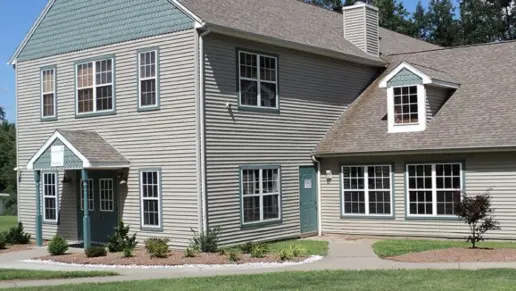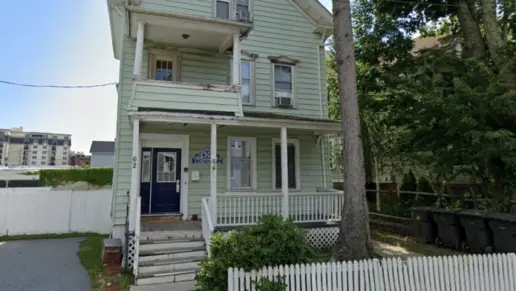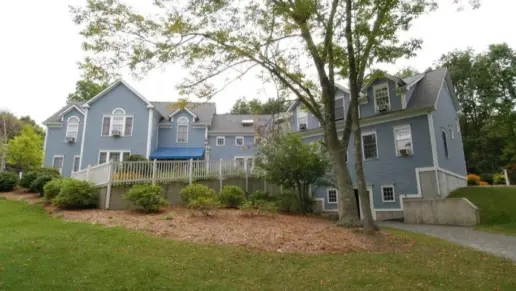Those such good people working in this rehabilitation center. They are very professional and like to help others. They are always very punctual and attentive.
About the Facility
Aware Recovery Care offers in-home substance abuse services to those individuals struggling with alcohol and drug addiction. The program includes family therapy, individual counseling and more. Aware Recovery Care is located at Madison, Connecticut.
Aware Recovery Care firmly believes that recovery is a process of real change where individuals also change their health and wellness, live self-directed lives and strive to reach their full potential. Recovery must include access to evidence-based and support groups.
Aware Recovery Care model includes pharmacotherapy for alcohol and opioid use disorders, when necessary, there are also random drug test to verify abstinence, and voluntary GPS monitoring to rebuild trust among loved ones.
Their therapists include evidence-based practices such as CBT, DBT and trauma therapy.
 Accreditations
Accreditations

State License
State Licenses are permits issued by government agencies that allow rehab organizations to conduct business legally within a certain geographical area. Typically, the kind of program a rehab facility offers, along with its physical location, determines which licenses are required to operate legally.
State License: Connecticut
License Number: 19589
 Treatment
Treatment
 Alcoholism
Alcoholism
If the body experiences withdrawal symptoms in the absense of alcohol, they are considered alcohol dependent. This is one of the defining characteristics of alcoholism, also knosn as alcohol use disorder (AUD). If a person has reached this state, they typically need professional treatment to recover. Alcohol rehab in Connecticut can provide a safe, supervised detox to withdraw from alcohol, followed by inpatient or outpatient rehab, then a maintenance program.
 Drug Addiction
Drug Addiction
Drug rehab in Connecticut provides the professional support that is often necessary to break free from drug dependency. With proper treatment, individuals can make changes that restore balance and health to their lives and achieve long-term recovery.
 Dual Diagnosis
Dual Diagnosis
In Connecticut, dual-diagnosis addiction treatment recognizes the importance of addressing both mental health and substance use disorders in their specialized rehab programs, including outpatient, inpatient, medically assisted detox, and partial hospitalization. Using evidence-based therapies like cognitive behavioral therapy, dialectical behavioral therapy, and experiential therapies, addiction experts address substance use disorders and mental health challenges simultaneously, improving recovery outcomes and reducing the risk of relapse.
 Mental Health and Substance Abuse
Mental Health and Substance Abuse
Connecticut’s dual-diagnosis rehabs typically provide comprehensive treatment for mental health and substance abuse. These specialized facilities integrate personalized treatment plans, psychiatric care, with therapeutic treatments like cognitive-behavioral therapy (CBT), family counseling, and educational groups. Usually there are inpatient or outpatient programs depending upon whether you also need medically-supervised detox and have other support needs. A rehab’s clinical team can provide a comprehensive assessment to determine the appropriate level of care and medical support you may need.
 Opioid Addiction
Opioid Addiction
Opioid rehabs specialize in supporting those recovering from opioid addiction. They treat those suffering from addiction to illegal opioids like heroin, as well as prescription drugs like oxycodone. These centers typically combine both physical as well as mental and emotional support to help stop addiction. Physical support often includes medical detox and subsequent medical support (including medication), and mental support includes in-depth therapy to address the underlying causes of addiction.
 Insurance and Financial
Insurance and Financial
Private insurance
Self-pay options
 Programs
Programs
 Adult program
Adult program
 Program for men
Program for men
 Program for women
Program for women
 Young adult program
Young adult program
 Levels of Care
Levels of Care
 Medically Assisted Detox
Medically Assisted Detox
Typically seen as a first step in the recovery process, medically assisted detox generally takes place in an inpatient setting under the 24/7 supervision of licensed medical professionals. It is considered the safest way to remove addictive drugs from your body. The length of a medical detox program is individualized, but it often takes around 5-7 days.
 Inpatient
Inpatient
Residential treatment programs are those that offer housing and meals in addition to substance abuse treatment. Rehab facilities that offer residential treatment allow patients to focus solely on recovery, in an environment totally separate from their lives. Some rehab centers specialize in short-term residential treatment (a few days to a week or two), while others solely provide treatment on a long-term basis (several weeks to months). Some offer both, and tailor treatment to the patient's individual requirements.
 12-Step
12-Step
12 step programs are a peer-directed, spiritually-focused approach to addiction recovery, though participants do not need to be religiously affiliated. They are also often considered to be the gold standard in addiction recovery. Participants self-select a sponsor to support them throughout the recovery journey. They also regularly attend group meetings, which are free, anonymous, and accessible multiple times daily in most communities. Dedicated programs for specialized groups, such as seniors, teens, and families, are widely available.
 Outpatient
Outpatient
Outpatient rehabs offer a wide variety of therapeutic programs to address clients’ unique and evolving needs. They are generally most effective for clients who have completed inpatient treatment and are medically stable. Most outpatient treatment centers prioritize addiction counseling and recovery-focused life skills training. Many also provide medication assisted treatment (MAT) for clients in alcohol and opioid recovery. Evening, night, and weekend sessions are commonly offered to accommodate clients’ schedules.
 Intervention Services
Intervention Services
Intervention services helps family or friends of addicts stage an intervention, which is a meeting in which loved ones share their concerns and attempt to get an addict into treatment. Professional intervention specialists can help loved ones organize, gather, and communicate with an addict. They can guide intervention participants in describing the damage the addict's behavior is causing and that outside help is necessary to address the addiction. The ideal outcome of an intervention is for the addict to go to rehab and get the help they need.
 Clinical Services
Clinical Services
Cognitive Behavioral Therapy
Cognitive Behavioral Therapy (CBT) is a therapy modality that focuses on the relationship between one's thoughts, feelings, and behaviors. It is used to establish and allow for healthy responses to thoughts and feelings (instead of unhealthy responses, like using drugs or alcohol). CBT has been proven effective for recovering addicts of all kinds, and is used to strengthen a patient's own self-awareness and ability to self-regulate. CBT allows individuals to monitor their own emotional state, become more adept at communicating with others, and manage stress without needing to engage in substance abuse.
Couples Therapy
Whether a marriage or other committed relationship, an intimate partnership is one of the most important aspects of a person's life. Drug and alcohol addiction affects both members of a couple in deep and meaningful ways, as does rehab and recovery. Couples therapy and other couples-focused treatment programs are significant parts of exploring triggers of addiction, as well as learning how to build healthy patterns to support ongoing sobriety.
Dialectical Behavior Therapy
Dialectical Behavior Therapy (DBT) is a modified form of Cognitive Behavioral Therapy (CBT), a treatment designed to help people understand and ultimately affect the relationship between their thoughts, feelings, and behaviors. DBT is often used for individuals who struggle with self-harm behaviors, such as self-mutilation (cutting) and suicidal thoughts, urges, or attempts. It has been proven clinically effective for those who struggle with out-of-control emotions and mental health illnesses like Borderline Personality Disorder.
Experiential Therapy
Experiential therapy is a form of therapy in which clients are encouraged to surface and work through subconscious issues by engaging in real-time experiences. Experiential therapy departs from traditional talk therapy by involving the body, and having clients engage in activities, movements, and physical and emotional expression. This can involve role-play or using props (which can include other people). Experiential therapy can help people process trauma, memories, and emotion quickly, deeply, and in a lasting fashion, leading to substantial and impactful healing.
Family Therapy
Research clearly demonstrates that recovery is far more successful and sustainable when loved ones like family members participate in rehab and substance abuse treatment. Genetic factors may be at play when it comes to drug and alcohol addiction, as well as mental health issues. Family dynamics often play a critical role in addiction triggers, and if properly educated, family members can be a strong source of support when it comes to rehabilitation.
Individual Therapy
In individual therapy, a patient meets one-on-one with a trained psychologist or counselor. Therapy is a pivotal part of effective substance abuse treatment, as it often covers root causes of addiction, including challenges faced by the patient in their social, family, and work/school life.
Nutrition Therapy
Nutrition therapy, aka medical nutrition therapy (MNT), is a way of treating physical, emotional, and medical conditions through diet. Specific dietary plans are designed by professional nutritionists or registered dietitians, and patients follow them in order to positively affect their physical and mental health. Every patient pass through nutrition assessment, consultation and counseling by their Registered Dietitian Nutritionist (RDN).
Trauma Therapy
Trauma therapy addresses traumatic incidents from a client's past that are likely affecting their present-day experience. Trauma is often one of the primary triggers and potential causes of addiction, and can stem from child sexual abuse, domestic violence, having a parent with a mental illness, losing one or both parents at a young age, teenage or adult sexual assault, or any number of other factors. The purpose of trauma therapy is to allow a patient to process trauma and move through and past it, with the help of trained and compassionate mental health professionals.
 Settings and Amenities
Settings and Amenities
-
Private setting
-
Yoga studio
-
Acupuncture room
 Contact
Contact
556 Washington Ave
Unit 201
North Haven CT, 06473


